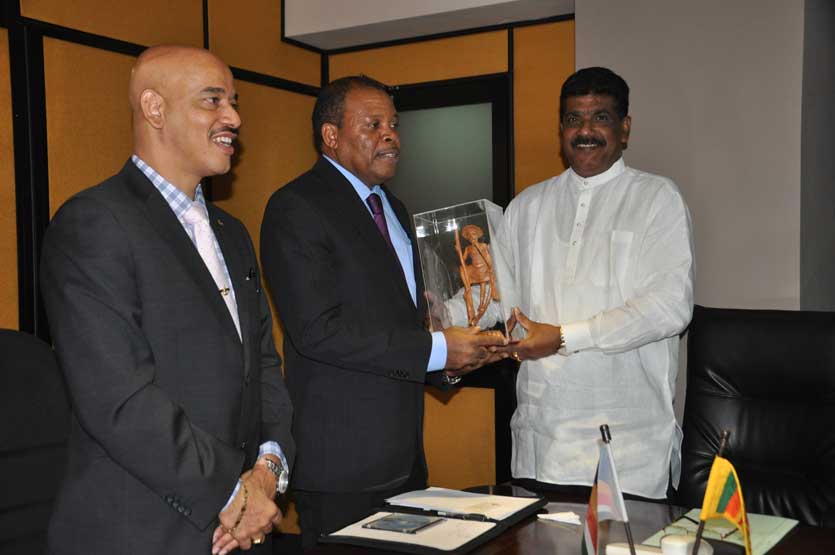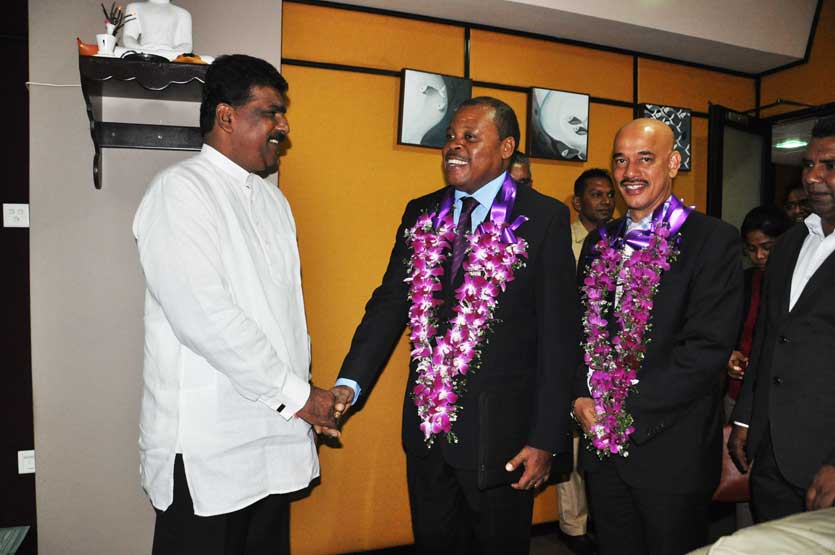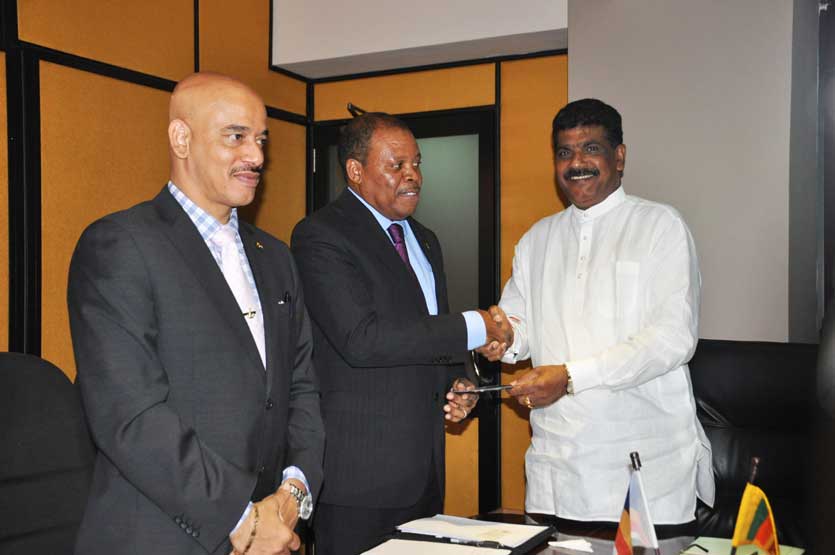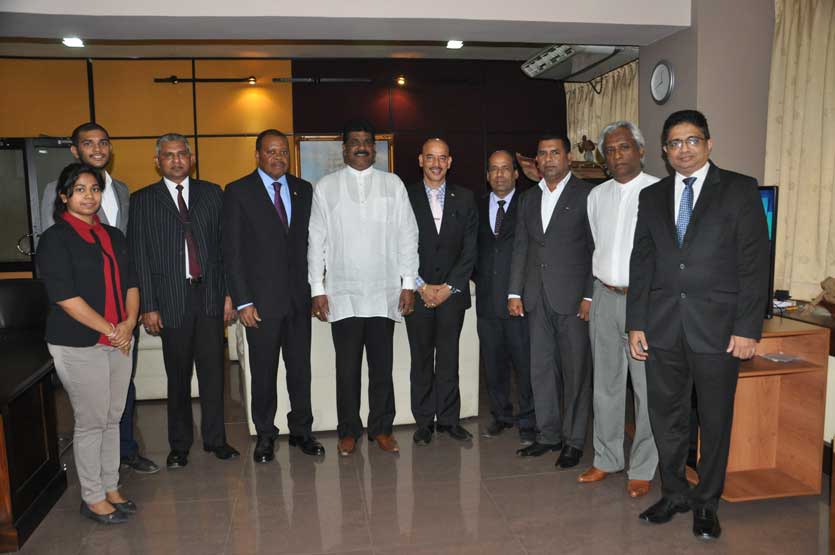Mar 07 2017.
views 504Life Online talks to Minister Dilip Wedaarachchi, State Minister of Fisheries and Aquatic Resources Development in Sri Lanka and Minister Michael Benstrong, Minister for Agriculture and Fisheries of the Republic of Seychelles.
Today this column is a bit different in comparison to the usual interviews we publish as I got the opportunity of meeting the Hon. Minister for Agriculture and Fisheries of the Republic of Seychelles, Michael Benstrong and was able to ask him a few questions related to fisheries and other related matters.
On an official visit to Sri Lanka the Hon Minister accompanied by His Excellency David Pierre the High Commissioner of the Republic of Seychelles paid a courtesy call on the State Minister of Fisheries and Aquatic Resources Development of Sri Lanka – Dilip Wedaarachchi. After exchanging formalities and discussing many issues related to the two island nations the visiting delegation was hosted to lunch at the Sea Fish Restaurant on Regal Street where a fabulous meal with all the seafood imaginable was served to the delegation.

Here are some excerpts of the meeting with both Ministers.
Your ministry were the pioneers in launching the BLUE ECONOMY concept to Sri Lanka. This is not a very familiar subject to some. Can you elaborate?
Although we inherit an ocean surrounding our country, we are not utilising the maximum potential of the resources that are freely available to us. Only the fisheries and salt industries are operational. Under the theme of ‘Exploring the Shades of Blue’ the concept was launched last year by the High Commission of Australia. Accordingly we hope to start up multipurpose fisheries harbour complexes which will incorporate all aspects to make them into four fully-fledged modern cities with their own power generation, waste management etc., The Korean Ministry of Fisheries are in the process of doing the feasibility study for the project. The proposed plan for the island of Delft which is to be converted to one of these multipurpose fisheries harbours has been already submitted for approval. The power generation for the island will be by tidal wave energy. The plan is to make this into a modern city like Singapore and it is structured to bring in its own revenue to sustain the city.
What would you say is an important aspect that needs to be addressed in the development of the Industry of Fisheries and Aquatic Resources?
One of the main goals is that the Hon Minister Mahinda Amaraweera and I have is to educate the people of this industry that fisheries matters are not restricted to the sea only. Sri Lanka possesses more than 10,000 inland reservoirs and over 116 lagoons and we are not making maximum use of these resources. We want to develop the reservoirs and lagoons and develop the fresh water fish culture. If these resources are put into proper use we will have a booming fisheries sector with a more bountiful harvest, better revenue, direct and indirect employment opportunities and additional related industries. Fishing in the sea can go on as it has been happening through the years.
We have started a massive crab farming project in Rekawa, a village in Tangalle. People involved in the fisheries industry should see this massive hatchery, then they will realise that fisheries is not restricted to the sea only. This hatchery which has been built on a land of 55 acres on the border of an 800 acre lagoon is a project that was started up in partnership with a private company. It comprises all modern facilities and state of the art technology.

What new measures have been taken to ensure the safety of fisherman out at sea?
In 2015 when we came into power we proposed many aspects that needed to be implemented in order to upgrade the standards of safety for the fishermen. Usage of life crafts was also one of them. The life jacket system doesn’t work with our fishermen because they never wear it however much they are told to do so. We proposed that life crafts should be utilised for the safety of the fisherman until the bigger boats from the shore comes to rescue them, in case of an emergency.
What are your comments on the Katukurunda disaster which took place recently?
If those people wore life jackets, they would have not died. They could see the shore but couldn’t do anything to help themselves. The vessels were also loaded way beyond capacity. After this incident, even the fisher folk would realise that they should have followed regulations when taking people out to sea.
In the future, punishment for breaking the law will be more severe. Boat licences will also be cancelled if regulations are not adhered to.
What development projects are you planning for the people of your electorate?
The largest hospital in Tangalle was in a dilapidated condition with absolutely no facilities for the patients who come for treatment. This is the only hospital available for the people in the electorates of Valasmulla, Weeraketiya, Katuwana, Beliatta, and Angunukola. The previous regime had done nothing about this problem during their tenure of nine years. Last month on a visit to this hospital Hon Minister Rajitha Senaratne complied with my request and approved a plan to build a 10 storey hospital complex with all facilities, state of the art technology, two ambulances, and a separate children’s hospital.
Minister Michael Benstrong
What is your vision to further develop and strengthen the 30 year long diplomatic ties with Sri Lanka?
We need to look at proposals that will benefit both countries. We already have an MOU with Sri Lanka so I will see if what we have discussed here today with your State Minister of Fisheries is captured in the MOU. I will revisit the MOU and make sure that it reflects the modern way of moving forward for the benefit of the two countries. I believe that being two island nations we can share a lot.
In Seychelles we have limited land mass but we a have huge sea area 1.3 million sqkm. We have the resources and we believe that there’s a lot more that can be done with Sri Lanka. I have the same vision as your State Minister, that is to enhance the development of the fisheries industry and all matters related to it.

As there are many fisherman from Sri Lanka working in your country, what would you say about their standards compared to your fisher folk?
Yes, we have quite a number of fisherman from Sri Lanka and the numbers are currently on the increase. The techniques used by Sri Lankan fisherman in the long line fishing are excellent. This is something Seychelles hasn’t been doing for a long time. We have started investing in the long line fishing only very recently. The techniques and know how in this area of fishing is something we need to learn from Sri Lanka.
Is aqua culture popular in Seychelles?
Aqua culture is something new to us. We will be launching our pilot project sometime this month. I am pleased to see the amount of work done and the ‘know how’ that has developed over the years not only in fishing but in aqua culture as well, in your country. We can share a great deal in terms of investment and ‘know how’ in this sphere.
Seychelles is supposed to have the largest fish canning factory in the world. Is that correct?
Until very recently we had the biggest canning factory in the world. Right now it is ranked second or third. Being such a small country, to have had the biggest canning factory in the world just goes to show what expertise we have in this area. There are many Sri Lankans also working there. We export products from this factory mainly to Europe. The famous John West canned fish products that you get on the shelves in London are made at this factory.

What is the main industry in Seychelles and where does the fisheries sector come in?
Our population comprises only 93,000 people. Our income per capita is very high. As of now our main industry is tourism and second comes fisheries. We have foreign investors coming in and investing specially in the production of tuna. Our main export is red snapper, garoupa and swordfish. We believe that the fisheries industry can be equal to the tourism industry or even more so because of the size of Seychelles in terms of sea. This is where we believe our future investments should be.
Do you have people from other countries fishing in your seas? If so, how do you earn from it?
Yes, we have mostly Europeans fishing in our seas. We issue them a licence and whatever they catch belongs to them and they sell it in the world market. Our canning factory will also buy whatever is required. Right now we earn only from the annual licence. But in the near future we will be charging a proportionate amount from the catch. We have already negotiated with EU regarding this matter.
0 Comments